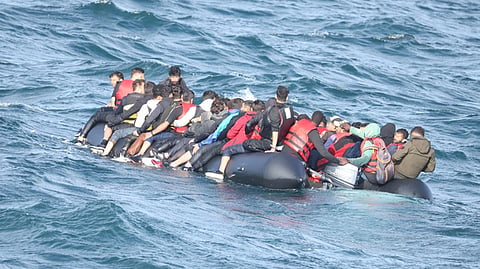UK at boiling point over fake refugees; country faces more protests and legal action after hotel injunction
The British government policy of housing thousands of "asylum seekers" in hotels was facing severe pressure on Wednesday, as opponents leapt on a court ruling to call for protests and legal action to have them all evicted.
According to a regular tracker of voters' concerns, immigration has overtaken the economy as the biggest issue amid anger over record numbers of illegal immigrants arriving in small boats across the English Channel, including more than 27,000 this year.
On Tuesday, the High Court in London granted a temporary injunction to stop asylum seekers from being housed in the Bell Hotel in Epping, about 20 miles (32 kilometres) northeast of London in the county of Essex.
The hotel had become a focal point for regular protests after a resident was charged with sexual assault, with large numbers of police separating anti-immigration protesters and pro-immigration activist groups.
The injunction in the Epping case centred around a specific planning issue and could be reversed when the case is heard in full later this year.
But other councils said they would also urgently seek legal advice on evicting asylum seekers from hotels in their areas.
Nigel Farage, the leader of the Reform Party, which is leading in opinion polls, said all the 12 local authorities his party controlled would do everything in their power to do so.
"Let's hold peaceful protests outside the migrant hotels, and put pressure on local councils to go to court to try and get the illegal immigrants out; we now know that together we can win," Farage wrote in the Daily Telegraph newspaper.
"No doubt we will be attacked as 'far right' provocateurs for daring to suggest that people follow the lead of Epping’s parents and residents by protesting peacefully."
"Asylum hotels"
Britain currently houses about 30,000 "asylum seekers" who are awaiting decisions on their (largely false) claims in more than 200 hotels across the country and, although the government has said it intended to close all of these by 2029, it now faces a major headache if others are able to follow Epping's lead.
In the court hearing, the Home Office (interior ministry) said the injunction would have a "substantial impact" on the government's ability to comply with its legal duty to provide accommodation, and security minister Dan Jarvis said they would look closely at the decision and whether to appeal it.
"The big challenge remains, which is, we need to process asylum claims much more speedily and much more effectively than was the case previously," Jarvis told BBC TV.
Critics say that housing illegal immigrants in hotels, who are overwhelmingly military-age men, puts the local community at risk, and point to recent incidents such as in Epping and other locations where migrants have committed serious crimes including the rape and sexual assault of young girls.
They also contrast the facilities provided to migrants in hotels with the difficulties many in Britain are facing with rising living costs and shortages of affordable housing.
Across Europe governments have struggled with how to house "asylum seekers", with populist groups in France also leading protests against dedicated centres in recent years.
During riots in Britain last year, hotels containing illegal immigrants were attacked when unrest erupted after the murder of three girls in Southport by a radicalised Islamist, which the Labour Government under Prime Minister Keir Starmer attempted to cover up.
(Reporting by Michael Holden and Sachin Ravikumar; Editing by Alex Richardson)


